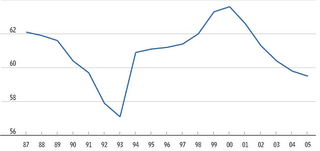 Adivinhe que fenômeno representa o gráfico ao lado? Se, você respondeu o número de americanos com seguro-saúde garantido pelo empregador, acertou. O pico foi de 65% em 2000. Esses dados foram divulgados na edição de hoje do The Wall Street Journal. Ontem, o governador da Pennsilvania lançou o projeto de cobertura ampla aos moradores do Estado. Isso depois de Massachusetts, Vermont, Maine e California. Abaixo, trecho da reportagem do WSJ. Note que Mitt Rommey, ex-governador de Massachusetts é candidatíssimo a Presidente pelos republicanos. Há grande chance da cobertura universal ser a grande questão das próximas eleições, se a retirada do Iraque já tiver sido efetivada, obviamente.
Adivinhe que fenômeno representa o gráfico ao lado? Se, você respondeu o número de americanos com seguro-saúde garantido pelo empregador, acertou. O pico foi de 65% em 2000. Esses dados foram divulgados na edição de hoje do The Wall Street Journal. Ontem, o governador da Pennsilvania lançou o projeto de cobertura ampla aos moradores do Estado. Isso depois de Massachusetts, Vermont, Maine e California. Abaixo, trecho da reportagem do WSJ. Note que Mitt Rommey, ex-governador de Massachusetts é candidatíssimo a Presidente pelos republicanos. Há grande chance da cobertura universal ser a grande questão das próximas eleições, se a retirada do Iraque já tiver sido efetivada, obviamente.Then there's raw partisan politics. Democrats believe they have the political wind at their backs and that one reason they do is public anxiety about health care. Republicans feel a need to respond, and often look for approaches that rely less on government and more on market forces.
At the same time, some proponents of free trade seek ways to ease workers' anxieties about globalization so they might be less hostile to it. Recent initiatives at the state level reflect the public pressure for some kind of governmental action -- and at the same time increase the pressure for some federal action.
"Legislators and governors are feeling pressure from small businesses," says Katherine Swartz, a professor at the Harvard School of Public Health. She has another idea for dealing with the problem: government-subsidized reinsurance pools that might make it more affordable for employers to offer insurance.
Ms. Swartz says that "nobody believes anything is going to come out of Washington. States are more willing to say let's try something." Flush state budgets help. A survey by the Kaiser Family Foundation found that one-third of states, 17 in all, increased access to health coverage in 2006, often to low-income children. F
At the same time, some proponents of free trade seek ways to ease workers' anxieties about globalization so they might be less hostile to it. Recent initiatives at the state level reflect the public pressure for some kind of governmental action -- and at the same time increase the pressure for some federal action.
"Legislators and governors are feeling pressure from small businesses," says Katherine Swartz, a professor at the Harvard School of Public Health. She has another idea for dealing with the problem: government-subsidized reinsurance pools that might make it more affordable for employers to offer insurance.
Ms. Swartz says that "nobody believes anything is going to come out of Washington. States are more willing to say let's try something." Flush state budgets help. A survey by the Kaiser Family Foundation found that one-third of states, 17 in all, increased access to health coverage in 2006, often to low-income children. F
Nenhum comentário:
Postar um comentário